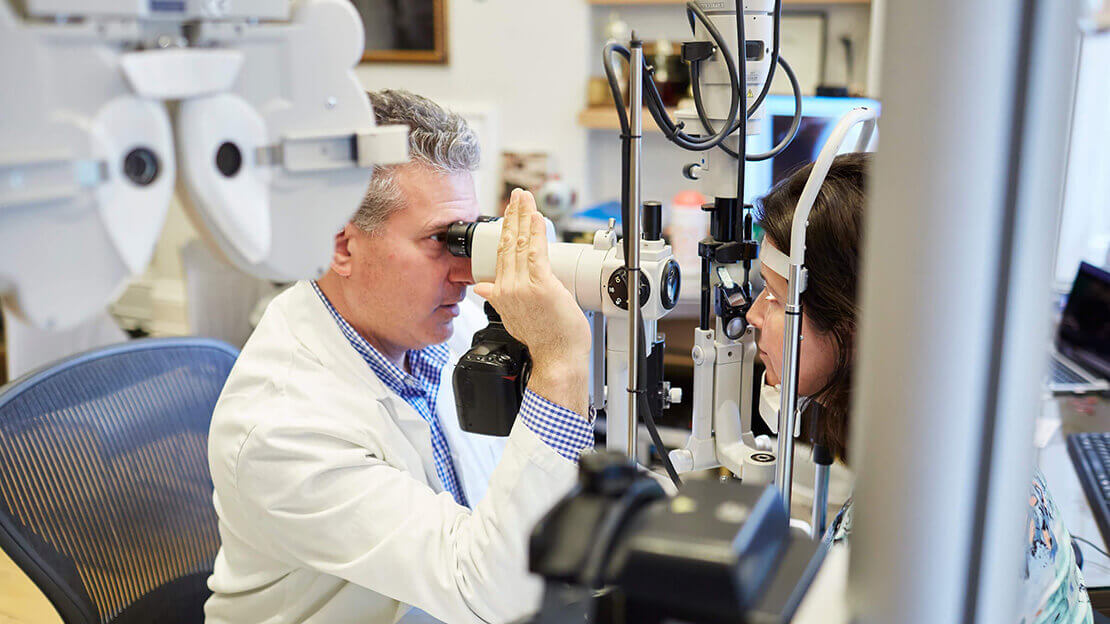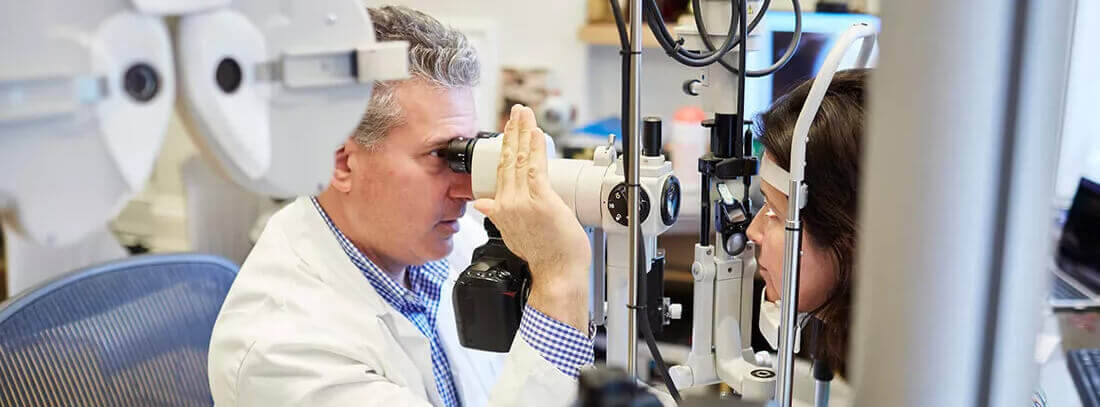Learn more about Cataract Surgery
If you’re in need of Cataract Surgery, it may be beneficial to learn more about the procedure and what you can expect from your treatment – particularly if you are considering choosing a private clinic.
Below, we’ll be answering some frequently asked questions about Cataract Surgery. You may wish to discuss some of these questions with your optometrist or surgeon before your treatment.
Cataracts occur when the proteins in the eye’s natural crystalline lens begin to break down. Over time, these proteins clump together, forming cloudy obstructions in the lens. While cataracts are considered a normal part of the eye’s ageing process, they can significantly affect your vision and quality of life. As the cataract matures, treatment will be necessary to prevent serious vision loss.
Cataracts can develop in one or both eyes. If they affect both eyes, they tend to develop at different rates. This means that they won’t necessarily become noticeable, or require treatment, at the same time.
For more information on what cataracts are and how they affect your eyes, click here.
Cataract Surgery is the only treatment that has been proven effective for cataracts. Cataracts can take years to become noticeable, so you may not need to have surgery immediately; however, treatment should not be postponed for long once recommended by a doctor.
If left untreated, cataracts will continue to mature, potentially making treatment more difficult and eventually leading to significant vision loss.
For more information about waiting for Cataract Surgery, click here.
Cataract Surgery is the most common elective procedure performed in the UK. It has an excellent success rate and is generally considered safe; however, as with any surgical procedure, it is not without risk. Your doctor should make you aware of the potential risks and side effects of Cataract Surgery before you undergo treatment.
Potential complications of Cataract Surgery include retinal detachment, glaucoma, and retention of the cataract. Side effects can include mild discomfort, watery eyes, and grittiness in the eyes. In most cases, these symptoms resolve within a matter of weeks.
For more information regarding the potential complications and side effects of Cataract Surgery, click here.
Cataract Surgery has a very high success rate. The relative simplicity of the procedure means that between 95% and 99% of Cataract Surgeries are successful. However, some factors, such as the patient’s age and the stage of cataract development can affect outcomes.
To learn more about the factors that can affect your visual outcomes following Cataract Surgery, click here.
The primary aim of Cataract Surgery is to remove the cloudy obstruction from the eye and restore any resulting vision loss. By replacing the cataract-affected lens with a clear, artificial one, Cataract Surgery can significantly improve blurriness and visual acuity.
Current results indicate that over 90% of patients will achieve a best-corrected visual acuity of 6/18 or better following treatment.
For more information on what to expect after Cataract Surgery, click here.
Your visual acuity after Cataract Surgery will depend on several factors. Cataract Surgery provided by the NHS involves the use of monofocal intra-ocular lenses (IOLs) which are only designed to focus at one distance. This means that patients with an existing refractive error will need to wear contact lenses or glasses to achieve the best visual outcomes.
At private clinics, patients can be fitted with premium IOLs to correct their existing refractive error. In these cases, most patients do not require glasses or contact lenses following their treatment.
For more information about glasses after Cataract Surgery, click here.
Different types of IOLs can be used in Cataract Surgery. NHS Cataract Surgery uses primarily monofocal IOLs which are designed to correct vision at a single distance. This can mean that patients may require glasses or contact lenses following the procedure to ensure the best visual acuity.
Premium lenses (used in private Cataract Surgery) can be toric or non-toric and correct various refractive errors, including short-sightedness, long-sightedness, and astigmatism. The best option for you will be determined through an eye examination.
For more information on the different types of intraocular lenses, click here.
Your need for Cataract Surgery will be determined through several tests and examinations, performed by an optometrist. These tests will confirm the presence and severity of the cataract(s) and confirm whether you are suitable for treatment. Common tests include:
- Visual acuity test
- Slit-lamp examination
- Retinal exam
- Applanation tonometry
For more information on what to expect before Cataract Surgery, click here.
Following Cataract Surgery, your eye(s) will be sensitive and more vulnerable to infection. You will be advised to avoid any activities that may result in any damage to your eyes. This will include avoiding dusty environments and taking part in certain sports and exercises.
Your doctor will provide you with more information on your recovery prior to your treatment.
For more information on activities to avoid after Cataract Surgery, click here.
You may need to do several things in the days before your Cataract Surgery. For example, patients who usually wear contact lenses will need to stop wearing them, and you may be asked to stop taking certain medications. You may also want to make any necessary preparations for your recovery.
Your doctor will discuss any pre-operative requirements during your consultation and advise you of any changes you may need to make following your treatment. To learn more about Cataract Surgery and lifestyle changes, click here.
As Cataract Surgery is a minor procedure (you won’t need to be put to sleep), you will be able to return home on the same day as your treatment. Many patients notice an immediate improvement in their vision; however, it can take. a few weeks for your eye(s) to fully recover.
During your recovery, you will need to follow the guidelines provided by your surgeon. This may include avoiding physical activities and keeping your eyes protected from dust, debris, and any potentially harmful objects.
For more information about your recovery after Cataract Surgery, click here.
Cataract Surgery is the only effective treatment for cataracts. By removing the cataract-affected lens from the eye, the procedure can significantly improve your vision. Over 95% of Cataract Surgeries are considered successful and are completed without complications.
However, several factors can affect your outcome following the procedure. These can include ocular and systemic comorbidities as well as your age and how mature the cataract is. Nonetheless, Cataract Surgery is considered to be a safe and effective routine procedure.
For more information regarding the factors which may affect the outcome of your treatment, click here.
You may be required to attend one or more follow-up appointments after your Cataract Surgery. These appointments allow your doctor to check the procedure went to plan and rule out the need for further treatment. While uncommon, this will be the case if you develop Posterior Capsule Opacification (PCO) or if there is some retention of your cataract.
Patients can also use these appointments to discuss their treatment and clarify the details of their aftercare routine.
For more information on additional treatment after Cataract Surgery, click here.
Cataract Surgery is available through the NHS and private hospitals and clinics. As such, the cost of the procedure can vary significantly. While NHS Cataract Surgery is free, it is limited in its use of monofocal intraocular lenses which may mean patients are still reliant on glasses after their treatment.
Moreover, Cataract Surgery will only be offered on the NHS once the cataract(s) begins to cause significant impairment to vision and quality of life and waiting lists can be long. For this reason, many patients opt for treatment at a private clinic, which offers premium intraocular lenses and shorter waiting times.
At London Vision Clinic, the cost of Cataract Surgery includes your pre-operative evaluations and post-operative care and medications, in addition to the procedure itself. Many health insurance providers cover the cost of Cataract Surgery; however, you should check the details of your policy with your provider to confirm this.
For more information regarding private vs NHS Cataract Surgery, click here.
London Vision Clinic is home to some of the most experienced refractive surgeons in the country (and the world!). Each of our surgeons has been chosen for their world-class expertise to ensure our patients receive the best possible standard of care.
We offer high-quality, personalised treatment and have one of the best success rates for Cataract Surgery in the country. This is thanks to the knowledge of our team of surgeons and our unique access to the most up-to-date technology.
For more information about what makes Cataract Surgery at London Vision Clinic as effective as possible, click here.
We are grateful to our patients for taking the time to share reviews and testimonials regarding their experience at London Vision Clinic. We now have thousands of 5-star reviews from our patients, including those who had Cataract Surgery at our Harley Street clinic. For example, Nadya, who had Cataract Surgery with Mr Alistair Stewart at London Vision Clinic in 2021, had this to say:
“Mr Alistair Stewart operated on me and he was so caring and made me feel totally at ease during the procedure. Even though I was due to see him the day after surgery, he even contacted me the afternoon of my surgery to see how I was doing.
“I felt so cared for. The aftercare has also been exceptional with regular check ups during the first year after surgery. Definitely recommend this clinic.”
To see more of our patient reviews for Cataract Surgery, view our TrustPilot page here.

